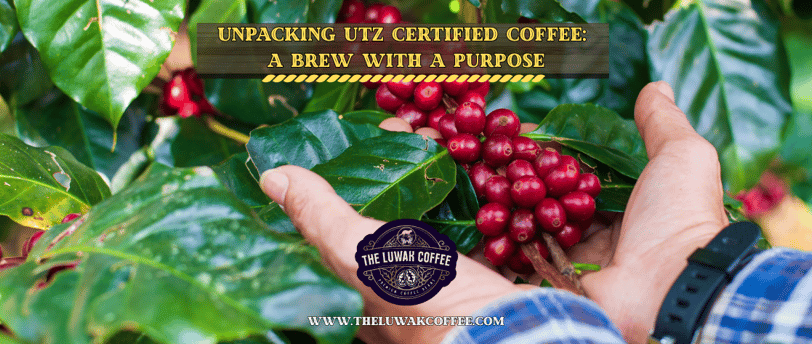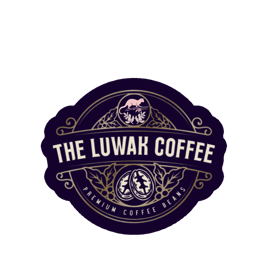CERTIFIED WILD LUWAK COFFEE, 100% WILD
Unpacking UTZ Certified Coffee: A Brew with a Purpose
COFFEE QUALITY ASSESSMENT
2/20/20257 min read


What is UTZ Certification?
UTZ Certification is an esteemed sustainability program aimed at promoting responsible farming practices, particularly in the coffee sector. Established in 2002, UTZ was created to empower farmers, improve their livelihoods, and encourage sustainable farming techniques. The term "UTZ" derives from a Mayan word meaning “good,” which encapsulates the initiative's core principles: sustainability, quality, and social responsibility.
The certification process is rigorous and requires participating farmers to adhere to a set of sustainable agricultural practices. This not only enhances the quality of the coffee produced but also ensures that environmental impacts are minimized. Through training and resources, farmers are guided in adopting methods that conserve biodiversity, manage water resources wisely, and reduce chemical input. By implementing these practices, UTZ-certified coffee producers are equipped to maintain the health of ecosystems while maximizing their yield and profit.
UTZ's commitment extends to ensuring fair working conditions for employees and promoting social equity among farming communities. This certification process requires farmers to engage transparently with their workers, fostering a collaborative atmosphere that prioritizes education and community welfare. Farmers gain access to valuable market information and connect with buyers who appreciate their commitment to high-quality, sustainably grown coffee. This creates a direct link between ethical consumption and responsible production, allowing consumers to make informed choices when selecting their coffee.
Overall, UTZ Certification not only fosters environmentally friendly farming practices but also supports the welfare of farmers and their communities. As consumers increasingly seek out sustainable products, UTZ has become a vital component in the quest for a responsible coffee supply chain, enhancing both the social fabric of farming communities and the quality of the coffee enjoyed worldwide.
The Importance of Sustainable Coffee Farming
Coffee is one of the most widely consumed beverages globally, with its production having far-reaching implications for the environment, society, and economy. Unsustainable coffee farming practices contribute significantly to various global issues, including deforestation, exploitation of labor, and the adverse effects of climate change. The environmental impact is particularly concerning, as traditional coffee farming often leads to the clearing of forests, which can result in loss of biodiversity and increased greenhouse gas emissions. Deforestation not only threatens plant and animal species but also disrupts local ecosystems that rely on forest habitats.
Socially, the coffee industry has been plagued by labor exploitation, where farmers work under unfair conditions for minimal wages. Many smallholder farmers face challenges such as lack of access to education, healthcare, and fair trading opportunities, prolonging a cycle of poverty within coffee-growing communities. In regions vulnerable to climate change, these issues are exacerbated, making it increasingly crucial to adopt sustainable practices that improve the quality of life for farmers and their families.
The UTZ certification addresses these pressing issues by promoting sustainable coffee farming practices that are environmentally friendly and socially responsible. This certification focuses on training farmers in the best cultivation methods, helping them increase productivity while minimizing harmful practices that damage the environment. Furthermore, UTZ certification ensures fair labor practices, empowering farmers and fostering better livelihoods. By supporting certified coffee, consumers can contribute to a positive impact on communities and ecosystems, thereby championing a sustainable future for coffee production. Sustainable practices in coffee farming are not just beneficial for producers; they result in higher-quality coffee that meets the growing consumer demand for ethically sourced products.
Key Benefits of UTZ Certification for Farmers
UTZ certification is a significant milestone for coffee farmers, providing them with a framework that promotes sustained agricultural development. One of the most essential benefits that farmers gain from UTZ certification is access to improved farming practices. Through the UTZ program, farmers learn effective techniques that not only enhance the quality of their coffee but also lead to better yields. This knowledge allows them to produce premium crops that can potentially command higher market prices, thereby increasing their income.
Additionally, UTZ certification emphasizes sustainability, encouraging farmers to adopt methods that are environmentally friendly and economically viable. This balance between productivity and ecological responsibility ensures the long-term viability of coffee farming as a livelihood. Farmers trained under the UTZ program are equipped to understand and implement practices such as integrated pest management, soil conservation, and efficient water use, which ultimately contribute to healthier farming ecosystems.
Moreover, the certification provides farmers with access to vital resources and market information. By being part of the UTZ network, they can connect with international buyers who value high-quality coffee produced under sustainable conditions. This connection not only increases their market reach but also empowers them to negotiate better prices for their produce.
UTZ certification also enhances the skills of farmers through various training programs. These programs cover not only agricultural techniques but also business management skills. As farmers develop a deeper understanding of market dynamics and customer preferences, they become more adaptable to changing market demands. As a result, UTZ certified farmers are better positioned to thrive in a competitive marketplace.
In conclusion, the UTZ certification equips coffee farmers with essential knowledge and practices that lead to improved coffee quality, increased yields, and enhanced income potential, all while promoting sustainable agricultural methods.
Consumer Perspective: Why Choose UTZ Certified Coffee?
In recent years, the appreciation for sustainably sourced products has surged, and coffee is no exception. Choosing UTZ certified coffee represents a conscientious commitment to both environmental sustainability and social responsibility. UTZ certification ensures that coffee is grown with practices that conserve resources and promote biodiversity, all while supporting farmers and improving their livelihoods through fair labor practices.
Research demonstrates that consumer preferences are evolving, with a growing segment prioritizing ethically sourced products. According to recent statistics, the market for sustainable coffee has grown significantly, with sales of certified coffee varieties increasing by over 15% annually. This shift is indicative of a broader trend where consumers are not only looking for high-quality coffee but also products that align with their values. By selecting UTZ certified coffee, consumers play a pivotal role in fostering this movement towards sustainability.
Additionally, testimonials from coffee drinkers underscore the importance of transparency in the sourcing of their favorite brews. Many consumers express a greater sense of satisfaction when they know their coffee purchase directly contributes to initiatives that promote environmental stewardship and social equity. The familiarity and trust associated with UTZ certification can enhance the overall consumer experience, creating a deeper connection between the product and the purchaser.
By opting for UTZ certified coffee, consumers are actively supporting practices that result in positive environmental and social outcomes. This choice not only helps ensure that farming communities thrive but also promotes responsible land use and conservation efforts. As awareness grows, it is increasingly clear that every coffee purchase is an opportunity to make a positive impact—one cup at a time.
The Certification Process: What Does It Involve?
The UTZ certification process is designed to ensure that coffee production adheres to a set of rigorous standards focused on sustainability, quality, and social responsibility. The journey begins when farmers or producer groups register with the UTZ program. This step is critical, as it establishes the groundwork for their commitment to sustainable farming practices and adherence to the criteria set by the certification body.
Once registered, farmers engage in a self-assessment, where they evaluate their current practices against the UTZ guidelines. This process allows them to identify areas needing improvement, such as environmental impact, labor conditions, and economic viability. The self-assessment also fosters accountability, enabling farmers to develop action plans that align with UTZ's standards.
Following self-assessment, external audits are conducted by certified auditors to verify compliance with the established criteria. These audits are comprehensive and can include on-site inspections, interviews with workers, and reviews of documentation. The purpose of this stage is to validate that the farming operations meet the UTZ requirements before certification is granted. The auditing process helps maintain the integrity of the UTZ label, assuring consumers that certified products are genuinely produced under sustainable conditions.
Once the external audit is complete, any necessary corrective measures are implemented, and the producers are notified of their certification status. If they meet all requirements, they receive the UTZ certification, allowing them to market their coffee as responsibly produced. However, the certification process does not end here; regular compliance checks and subsequent audits are necessary to ensure ongoing adherence to the UTZ standards, promoting continuous improvement within the coffee industry. By committing to this rigorous certification process, producers demonstrate their dedication to sustainable practices, ultimately benefiting both the environment and their communities.
Challenges and Criticisms of UTZ Certification
While the UTZ certification system aims to promote sustainable agricultural practices and improve the livelihoods of farmers, it is not without its challenges and criticisms. One significant concern is the accessibility of certification for smallholder farmers. Many small-scale producers face barriers that hinder their ability to meet the stringent requirements set by the UTZ program. These barriers often include a lack of resources, insufficient knowledge about the certification process, and geographical isolation that limits access to support networks and training programs.
Additionally, the costs associated with UTZ certification can be prohibitive for smaller growers. The financial commitment necessary for training, compliance, and certification fees can be particularly burdensome, leading some farmers to forgo certification altogether. This situation raises questions about the inclusivity of the program and whether it truly serves the needs of the broader agricultural community. Critics argue that without affordable pathways for certification, the UTZ system may inadvertently favor larger plantations with greater resources, thereby marginalizing smallholder farmers.
Moreover, the effectiveness of the UTZ certification in achieving its sustainability goals has also faced scrutiny. Some studies suggest that the certification may not lead to substantial improvements in environmental practices or farmer incomes when compared to non-certified counterparts. This calls into question the tangible benefits of the program and whether it effectively drives meaningful change in the coffee industry.
In conclusion, a balanced perspective on the UTZ certification reveals both its ambitions and its limitations. While it strives to create a more sustainable coffee sector, the system must address the challenges it faces to truly accomplish its mission and include the voices of all stakeholders, particularly smallholder farmers.
The Future of UTZ Certified Coffee
The landscape of coffee certification is evolving in response to shifting consumer demands and pressing environmental challenges. UTZ Certified Coffee, a program dedicated to promoting sustainable farming practices, is poised to adapt to these developments. As consumers become increasingly conscious of their purchasing decisions, they seek products that align with their values, particularly in terms of environmental and social responsibility. This trend suggests a promising future for UTZ certified coffee, as it inherently addresses these consumer concerns through its commitment to sustainability.
In light of this growing awareness, UTZ is expected to implement enhancements to its certification process. These improvements may include more rigorous sustainability criteria tailored to the unique challenges faced by coffee farmers. With the introduction of evolving standards, UTZ aims to ensure that certified producers not only adhere to sustainability protocols but also engage in innovative practices that benefit both the environment and their communities. For instance, integrating agroforestry techniques may become a requirement, promoting biodiversity while enhancing coffee quality and yield.
Moreover, the coffee industry is increasingly acknowledging the necessity of transparency in its supply chains. UTZ certification exhibits a robust framework for traceability, supporting consumers in making informed choices. As global focus on sustainability intensifies, UTZ is also expected to forge partnerships with other organizations to bolster its impact. Such collaborations can foster knowledge sharing and offer additional resources to growers, enabling them to adopt sustainable practices effectively.
As these changes unfold, it is evident that the future of UTZ certified coffee is intricately linked to the coffee industry's ongoing commitment to sustainability. Through continuous improvement and adaptation, UTZ aims to enhance its certification process, contributing to a more sustainable coffee farming landscape.
